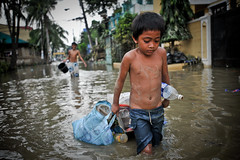 |
| Climate Risk and Resilience: Securing the Region’s Future (Photo credit: Asian Development Bank) |
General Resilience to Cope with Extreme Events(12 page pdf, Stephen R. Carpenter, Kenneth J. Arrow, Scott Barrett, Reinette Biggs, William A. Brock, Anne-Sophie Crépin, Gustav Engström, Carl Folke, Terry P. Hughes, Nils Kautsky, Chuan-Zhong Li, Geoffrey McCarney, Kyle Meng, Karl-Göran Mäler, Stephen Polasky, Marten Scheffer, Jason Shogren,Thomas Sterner, Jeffrey R. Vincent, Brian Walker, Anastasios Xepapadeas and Aart de Zeeuw, Sustainability, Nov. 28, 2012)
Today we review an article that looks at resilience when faced with extreme events, an especially timely topic given the recent hurricanes, droughts, forest fires, storm surges, earthquakes and tidal waves and the expectation that climate change will increase the frequency of rare weather-related disasters. Among the key activities and outlooks needed in advance of such disasters is the need to combine long term considerations into short term planned actions and the usefulness of such tools as planning alternate scenarios to identify needs.
Key Quotes:
“Resilience, in the context of environmental management and sustainability, is the capacity of a social-ecological system to absorb disturbance, reorganize, and thereby retain essential functions, structures and feedbacks”
“rare or unprecedented disturbances that are unusually intense or extensive require a more broad-spectrum type of resilience”
“Monitoring—the provision of transparent, relevant information about status and trends of the socialecological system—is essential for building and maintaining resilience. Indicators of social processes and the ecosystem help users and managers understand status and trends of critical ecosystem services. Sometimes indicators may provide early warnings of approaching thresholds”
“seven principles for enhancing resilience, which address
- diversity,
- connectivity,
- feedbacks and slow variables,
- polycentric governance,
- learning and experimentation,
- breadth of participation, and
- the complex adaptive characteristics of social-ecological systems”
“The greatest challenge of general resilience is to design and implement concrete policies and actions. Unless incentives are constructed properly, short-term decision making will tend away from the long term view that is needed to build and maintain general resilience. How can long-term practices be woven into actions that also meet the immediate needs of people and ecosystems?”






No comments:
Post a Comment